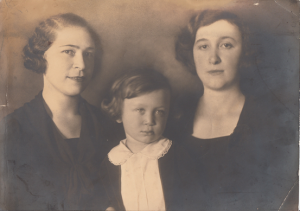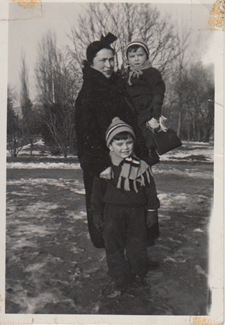Anka was my grandmother. She was born in 1906, the youngest of the five children of Ljubica and Nikola. Even though her name had a Hebrew origin, the outward appearance of my grandmother’s family was thoroughly Christian, Serbian. Anka’s grandfather was a Jewish musician Josif Schlezinger (1794-1870), who emigrated from Austria to Serbia to establish a first court-based orchestra and unknowingly brought a first violin to the country. Josif suffered anti-semitism although his position at the court was established and well respected, and so he decided that his children will be Serbian. His son was therefore born Nikola Petrović, and was brought up as a Christian child. Nikola was in turn one of the founders of the National Theatre in Belgrade and also one of the founders of the first orphanage in the country.
Anka told me how she remembered the sinking of Titanic and that everyone spoke about it. She was six at the time. She said that in her memory and in her family’s life, the feeling of unease grew from there on and the turmoil grew to become overwhelming with the outbreak of the First World War, the time during which she and her family spent in exile in France, returning to Serbia, then part of a newly founded Yugoslavia, in 1920. She was therefore no stranger to the life of exile by the time the Second World War broke out.
She grew up being taken care of in every possible way by her family, being the youngest of the five children. As a child she survived the outbreak of typhoid, scarlet fever and polio. The latter left a scar on her body, and one of her legs was shorter than the other. Anka was therefore considered, although well bread and beautiful in every other way, somewhat damaged and she married my grandfather who would not have been considered a suitable match otherwise, as he was of a peasant origin. They had two children, my father Miloš and his brother, Nikola.
When the first bombing of Belgrade started on 6th April 1941, the Yugoslav army was immediately called upon. Djordje, Anka’s husband, was a major and went with the rest of his men to report at the garrison. The Unternehmen Strafgericht – the Operation Retribution as Yugoslavs broke the original agreement to let German forces through –lasted for only seven days but destroyed most of central Belgrade and resulted in the surrender of Yugoslav forces, so my grandfather ended up as a Prisoner of War in a camp in Germany where he spent the remainder of the war. My grandmother and her children never saw Djordje again.
My baba (Serbian for grandmother) calculated that should she remain in the city she and the children would chance being killed in the bombing or robberies and violence that necessarily follows it. The city suffered great losses during this campaign, and the area where they lived was in fact later destroyed. But at the back of my grandmother’s mind was the fact that her family was well known and that there was a possibility of her being identified as of Jewish origin. So she, her sister Lela with her children, and their brother Božidar, packed the necessary things and went to town Zaječar in the south-eastern Serbia, near a border with Bulgaria, then Vratarnica, a village from which Anka’s husband, my grandfather Djordje came, and where they had relatives and some land.
The time in Vratarnica no one remembers fondly. The women and children were relatively safe and looked after by their older brother Božidar, and they all had where to stay with the family. But the family they found from unfriendly to bordering on hostile. The village relatives didn’t particularly take to the town’s folk in many ways: my grandmother and her sister dressed differently, they spoke differently, and their background was all together beginning to feel very different to that of the rest of the family. My grandmother, who took her gold and her jewelry with her, told me that there were times when she was paying for a small bag of flour with a pair of gold earrings – and the sellers were the brother and wife of her husband. My father who witnessed it as a child never wanted to speak about it.
But another, much more unhappy memory is linked to this village and this period. Anka and Lela, were one day going to help out with working in the field outside the village, and as they were crossing an open area, out of nowhere, came a German plane. This was not an area where any offensives were taking place at the time, and my grandmother said that they must have plainly seen that these were two women going across a field, with their tools. But the plane let off a charge from its machine-gun, and Lela was hit in the upper thigh. My grandmother tried to stop the bleeding, but it became obvious that the bullets hit the important artery and Lela died within minutes. She was in her 30s, a fine woman with two small children. She made Anka promise to look after these children, Ljubica (my aunty Beba) and Antonije (Anta), who were, respectively, two and four years older than my father. Anka was devastated for a very long time. She cried every time she told me stories about this period, some forty to fifty years later.
The children and my baba survived as did her brother. They returned to Belgrade at the end of the war, and were all given a one bedroom flat by the new socialist government as my grandmother’s house was destroyed in the bombing. My grandfather never returned to Yugoslavia as the old army was discouraged to do so for the fear of another civil war due to the change of regime, and instead emigrated to Australia. Anka and children were not given the passport until 1955, but by then Djodje had died in Australia himself.
Anka lived until the age of 84, never claiming to be of any particular race or religion, but her life experience was that of exile and struggle, change of countries, regimes and circumstances. She fought with all she had for the survival of her family. She was, in that respect, a very happy and fulfilled person. Anka died at the beginning of the last war – the one that began in early 1990s and that broke Yugoslavia. That war in turn made me and my family exiles in England.
Comment on the story here.

